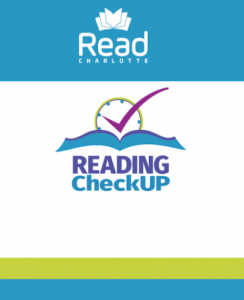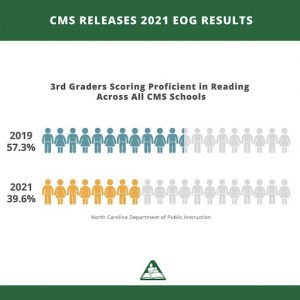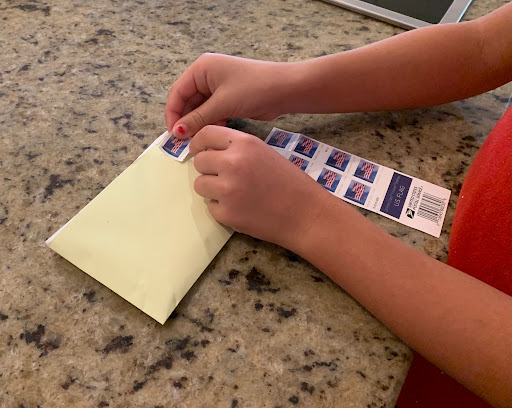Each school year, I shudder at the dreaded “reading log” in my child’s agenda. Don’t get me wrong. I enjoy reading, and my kids do too. It’s the commitment to another task and the struggle with habit formation that overwhelm — along with the guilt that inevitably sets in when we don’t get it done. Are you like us? Do you vow to change your reading and writing ways almost daily?
Fortunately, our very own CLT community has resources to help. Here are 5 helpful hints to get us Smarty parents started:
 1. Target support.
1. Target support.
It takes about 20 minutes to complete a Reading Checkup, which identifies where your child (Pre-K through 3rd grade) needs the most help. The child takes two quizzes, and parents get results and activities to use right away. This tool is provided at no cost to all Mecklenburg County residents by Read Charlotte and other partners.
2. Chunk it.
Just as it is difficult for us adults to honor a 60-minute workout each day, blocking off a continuous 20 to 30 minutes to read or write can be unrealistic or daunting for children. Instead, we can help them steal pockets of time for breaking this down into smaller bits. For example, a nightly chapter of reading with questions to answer can be broken down into a few 10 minute blocks of time this way: 10 minutes while waiting on the bus, 10 minutes while at the doctor’s office or other errands involving wait time, and 10 minutes while riding to and from after school activities.
3. Get carded.
September is Library Card Sign-Up month. A card entitles holders to books, of course, but also much more. Are your teens looking to land a part-time job or get into college? Charlotte Mecklenburg Library offers free resume prep and college admissions help. Have a home full of wee ones? They (and you) may love the StoryWalks program which provides a way to enjoy reading and the outdoors at the same time. The library also hosts Active Reading Workshops for families to help us learn how to actively read with our children. In the in-between-years? My children have gained confidence by being encouraged to ask librarians themselves where to find what they want to read (leading to some works and writers they are eager to read like Mrs. Smith’s Spy School for Girls and the author James Patterson). They’ve even had a chance to practice reading aloud to service dogs as part of the library programming.

4. Show, don’t tell.
I have a confession. I preach to my children about the importance of literacy and then don’t always make time for these activities myself. I have also been known to present reading and writing as chores to be done before other “fun” activities can be pursued. “Once you’ve completed 20 minutes, you may (fill in the blank.)” Sound familiar? That’s OK. We’re not perfect, but we can start to model behaviors we want to instill in our children. The best part is some moments of leisure can be acts of self care too.
– A cozy nook and a good book or magazine – Find or create a relaxing space with good lighting and “get caught” by the kids taking five for yourself to enjoy some reading.
– Pen pals are back (for Moms too!) – Remember how fun it was to receive mail? Rekindle that excitement for yourself (and snag some cute, free stationery swag) through The Change Exchange – part of The Maxx You Project. Better yet, to honor each sign up, T.J.Maxx is contributing $10 to Dress for Success (an organization that enables “women to achieve self-defined success through a network of support, development tools and professional attire.”) Sign up for free by September 20th! Remember all those new friends our kids made at camp this summer? Take time to help them send a note to one this week (while sneaking in a little literacy practice at the same time.)
Pen pals are back (for Moms too!) – Remember how fun it was to receive mail? Rekindle that excitement for yourself (and snag some cute, free stationery swag) through The Change Exchange – part of The Maxx You Project. Better yet, to honor each sign up, T.J.Maxx is contributing $10 to Dress for Success (an organization that enables “women to achieve self-defined success through a network of support, development tools and professional attire.”) Sign up for free by September 20th! Remember all those new friends our kids made at camp this summer? Take time to help them send a note to one this week (while sneaking in a little literacy practice at the same time.)
 5. Consider getting involved beyond your own home.
5. Consider getting involved beyond your own home.
A decline in reading proficiency among CMS students during the 2020-2021 pandemic school year is not surprising, but the near 20% drop is. Literacy attainment in elementary years significantly improves the likelihood of high school completion. As we see those third graders now moving along in grades, they may not be moving along in literacy without additional support. They can benefit from parents’ help at home and community volunteers. Next week, I start a new life adventure: training to become an Augustine Literacy Project tutor within a CMS Title I school. I invite you to learn more about this opportunity, as well as other literacy organizations like Read Charlotte that are helping to close gaps.



